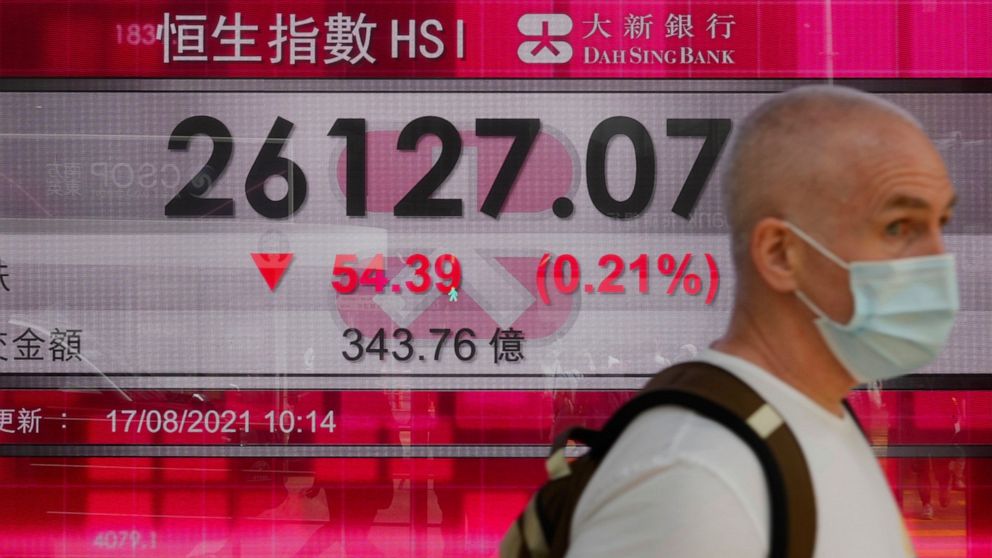Global markets lower amid China, Afghanistan unease
Global stock markets are declining amid turmoil in Afghanistan and unease about China’s economic outlook after July activity was weaker than expected
BEIJING — Global stock markets and Wall Street futures sank Tuesday amid turmoil in Afghanistan and unease about China’s economic outlook after weak July activity.
Investors looked ahead to a speech by Federal Reserve Chairman Jerome Powell for an update on the health of the biggest global economy. Traders also awaited U.S. retail sales and factory data.
Markets in London and Frankfurt opened lower. Shanghai, Tokyo and Hong Kong retreated.
On Wall Street, futures were lower a day after the benchmark S&P 500 hit a new high despite rising U.S. coronavirus infections.
Traders got “some positive sentiment” from Wall Street but were “paying close attention to the situation in Afghanistan,” Anderson Alves of ActivTrades said in a report.
Landlocked Afghanistan’s economy is tiny, but other governments were caught off guard by the speed of the collapse of its U.S.-allied leadership. Thousands of people tried to flee the country after the Taliban seized the capital, Kabul.
Markets also were digesting news that Chinese factory output, consumer spending and investment grew more slowly in July than expected. The government blamed flooding in central China and controls on travel and business to fight outbreaks of the coronavirus’s delta variant.
That depressed oil prices as traders adjusted forecasts of Chinese demand.
Beijing’s policy of pursuing zero virus cases “points towards the risk of aggressive measures” that “may continue to put a cap on growth,” Yeap Jun Rong of IG said in a report.
In early trading, the FTSE 100 in London was down less than 0.1% at 7,150.25. The DAX in Frankfurt declined 0.3% to 15,871.65 and the CAC 40 in Paris sank 0.5% to 6,804.12.
On Wall Street, futures for the S&P 500 index and the Dow Jones Industrial Average were off 0.4%.
On Monday, the S&P 500 and Dow both rose 0.3% while the Nasdaq fell less than 0.1%.
In Asia, the Shanghai Composite Index lost 2% to 3,449.98 and the Hang Seng in Hong Kong sank 1.6% to 25,750.45. The Nikkei 225 in Tokyo slipped 0.4% to 27,424.47 after spending most of the day in positive territory.
The Kospi in Seoul retreated 0.9% to 3,143.09 and Sydney’s S&P-ASX 200 shed 0.9% to 7,511.01.
India’s Sensex gained less than 0.1% to 55,624.76. New Zealand, Singapore and Jakarta declined while Bangkok gained.
On Wall Street, technology and health care stocks accounted for much of the gain in the S&P 500.
Sectors traditionally considered lower risk, including utilities and companies that make food and personal goods, also helped lift the market. Those gains outweighed a pullback in banks, energy stocks and a swath of retailers and travel sector companies.
Analysts had expected U.S. economic growth to slow from its breakneck pace earlier this year, but the highly contagious delta variant has prompted even more caution from investors.
In energy markets, benchmark U.S. crude lost 44 cents to $66.83 per barrel in electronic trading on the New York Mercantile Exchange. On Monday, the contract dropped $1.15 to $67.29. Brent crude, used to price international oils, shed 45 cents to $69.06 per barrel in London. It lost $1.08 to $69.51.
The dollar rose to 109.32 yen from Monday’s 109.24 yen. The euro declined to $1.1769 from $1.1776.
![]()


